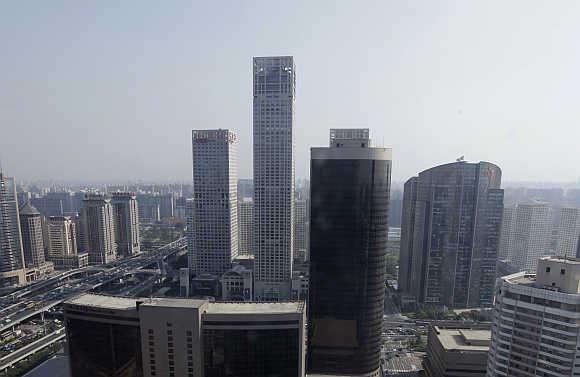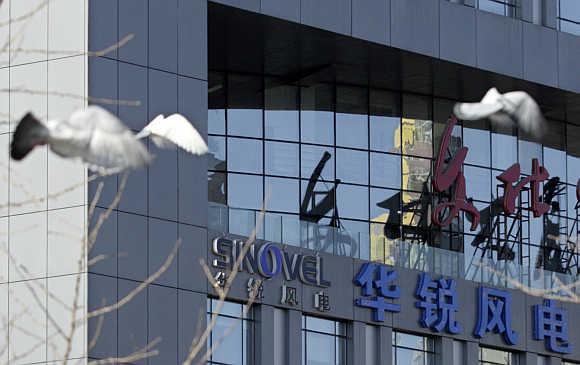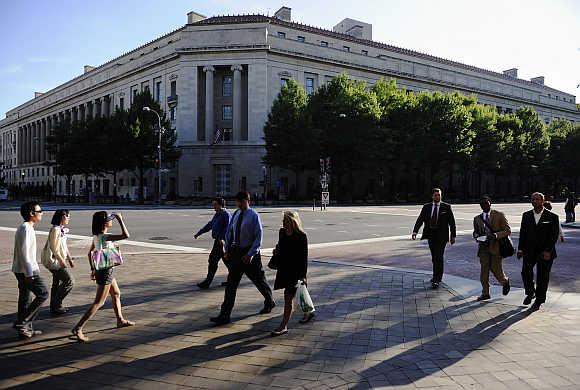Photographs: Jason Lee/Reuters John Foley in Beijing
American prosecutors have targeted Chinese wind turbine maker Sinovel for allegedly stealing secrets from a US rival. The threat of a $4.8 billion fine for a company with total assets of $4.6 billion sounds potent. But it doesn't address the economic conditions that make China a target for accusations of ideas theft. Call it the corporate espionage triangle.
AMSC, a US-based wind company, claims that Sinovel stole source code to its software, and used it to soup up the Chinese company's own products. Sinovel had not responded to the charges by June 28. But AMSC's claims add fuel for politicians who argue a wider point: that when it comes to company dealings, China doesn't play by the rules.
...
China's corporate spying: A three-cornered problem
Image: Pigeons fly past the company logo of Sinovel Wind outside its head office in Beijing.Photographs: Soo Hoo/Reuters
Consider the "fraud triangle" outlined by criminologist Donald Cressey in the 1970s: at the three corners are pressure, rationalisation and opportunity. The combination enables people to commit fraud - or perhaps engage in corporate espionage.
As the economy slows, Chinese companies are under lots of pressure. For wind turbine makers, years of ramping up growth have created excess capacity and falling earnings. A fifth of the turbines built in China aren't attached to the electricity grid, according to Bloomberg New Energy Finance.
There's plenty of rationalisation, too. Chinese politicians paint the country as an economic underdog.
...
China's corporate spying: A three-cornered problem
Image: Samples of china cups at a porcelain factory in the town of Dobrush, about 350km southeast of Minsk, Belarus.Photographs: Vasily Fedosenko/Reuters
British and Europeans pilfered the secrets of tea and porcelain from China centuries ago - which might make espionage look like an acceptable way to achieve growth. Large fines and arrests are hard to enforce across borders, so the perceived cost of getting caught may seem acceptably low.
Opportunities are also on the rise. Email and networks have increased the chances for governments and companies to purloin data. Companies can defend themselves with better controls over their people and systems - AMSC says that its secrets were sold on by one of its own employees.
But technology makes companies with covetable ideas inherently vulnerable.
...
China's corporate spying: A three-cornered problem
Image: Pedestrians walk on the sidewalk across the US Department of Justice headquarters building on Pennsylvania Avenue in Washington, DC.Photographs: Jonathan Ernst/Reuters
AMSC's battered shares rose over 6 per cent after the US Department of Justice launched its case against Sinovel. With the authorities on the case, the US firm may have a hope of getting back some of its $800 million of estimated economic losses.
But as China's economy decelerates, the triangle is likely to get sharper - and such cases will only become more common.
Context news
i) The US Department of Justice on June 28 charged Chinese wind turbine maker Sinovel Wind Group and two of its employees with stealing trade secrets from US-based AMSC. A former employee of AMSC was also named.
...
China's corporate spying: A three-cornered problem
Image: Turbines of Czech CEZ wind park, Europe's largest on land, in Fantanele and Cogealac villages, about 250km east of capital Bucharest, Romania.Photographs: Bogdan Cristel/Reuters
ii) "The allegations in this indictment describe a well-planned attack on an American business by international defendants - nothing short of attempted corporate homicide," said US Attorney for the Western District of Wisconsin John W Vaudreuil in a statement released by the DoJ.
iii) The indictment detailed economic losses of $800 million from Sinovel's alleged refusal to pay for goods and services. The potential fine to the company could be double that amount for each of the three charges, it added.
iv) Sinovel is accused of obtaining source code used to control wind turbines, and using the code in turbines sold in the United States.
...
China's corporate spying: A three-cornered problem
Image: A view of the Serbian Parliament building in capital Belgrade.Photographs: Marko Djurica/Reuters
Among the named defendants is a former engineering head of Sinovel, now living in Serbia.
vi) AMSC warned of a quarterly loss in April 2011 after saying Sinovel, which accounted for three-quarters of the US company's revenue, had refused shipments. Since then the company's shares have fallen by 95 per cent. In after-hours trading on June 27, the stock rose 6.8 per cent to $2.50.
vii) Sinovel said in May that it was under investigation from the China Securities Regulatory Commission for possible accounting violations.
viii) In March, Sinovel revised its 2011 earnings down by 22 per cent, citing an accounting error. Its shares fell 5.5 per cent on June 28, to 3.77 yuan.
ix) A spokesperson at Sinovel said the company would formulate an appropriate response in due course.








article